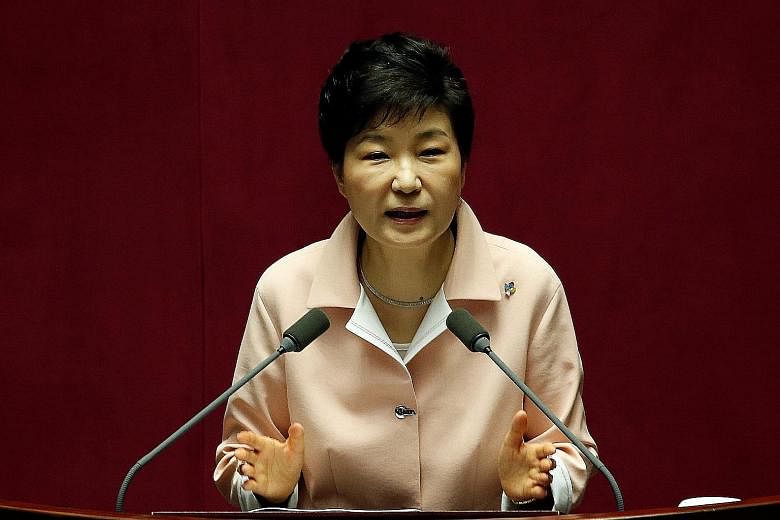With 19 months - or just under a third of her five-year term - still to go, the signs are that South Korean President Park Geun Hye is already a lame duck.
This was brought on by her Saenuri Party's unexpected loss in April's legislative elections, rendering her government a minority one, and hastened by unpopular moves by the President, including the decision to deploy the Terminal High Altitude Area Defence (Thaad) anti-missile system, say analysts.
The election defeat weakened Ms Park's support base in Parliament, making it harder for her to push through reform Bills aimed at revitalising the sluggish economy and creating more jobs for young people - two key campaign pledges that had led to her election in 2012.
Political scientist Kim Jae Chun of Sogang University said: "The big-time defeat dealt a great blow to President Park as she lost control over the legislative branch.
"That's one of the reasons why the lame duck (phase) arrived a little bit earlier than expected."
The signs that Ms Park is losing her grip on power are beginning to show. One sign is the emerging rift between the President and her party. Conservative newspapers, usually her staunch supporters, are also beginning to criticise her, noted Yonsei University's political science professor Moon Chung In.
It does not help that Ms Park opened herself to criticism when she defended a close aide accused of corruption.
Senior presidential secretary for civil affairs Woo Byeong Woo is alleged to have abused his power and engaged in corrupt practices, prompting calls - from newspapers, opposition parties and even lawmakers from Ms Park's party - for him to resign. He is now under investigation by an independent inspector's office set up last year to root out corruption.
However, Ms Park has continued to back him, stoking public anger and creating a rift between her and some key members of her party. This is worsened by disputes within the party between factions that are pro-Park and those that are not.
The President also came under fire for agreeing to deploy Thaad, an advanced anti-missile system from the United States meant to defend South Korea against the North's nuclear and missile threats. It has angered the Chinese because they see it as an attempt to put their military facilities within the reach of US radars.
Chinese Foreign Minister Wang Yi has said that the move "caused harm to the mutual trust between the two countries".
Some exchanges between the two sides have been cancelled as a result. China's Qingdao city pulled out of a beer-and-chicken festivalin Daegu, its sister city in South Korea.
South Koreans are divided over the system.
Those living in North Gyeongsang province, as well as activists and some opposition lawmakers, oppose it because they fear worsening inter-Korea relations and that Thaad's strong electromagnetic waves could pose health risks and damage the environment.
This region has been loyal to Ms Park, but that allegiance is fading fast.
The conservative newspapers have also questioned Ms Park's decision to deploy Thaad.
Prof Moon said the conservative newspapers seem to be trying to engage Ms Park's administration in the hope that it will listen to feedback. "But the Park Geun Hye government is taking it personally and is very indignant about that kind of critique," he added.
Some observers had earlier said that if Ms Park would shift her focus towards foreign policy, she could remain relevant for the rest of her term, despite the election setback.
However, she has given herself little room to manoeuvre, particularly in inter-Korean relations, by insisting that there can be dialogue between the two sides only after Pyongyang starts denuclearisation, something the North appears to have little inclination to do.
The deployment of Thaad has not only alienated the North further but also upset the Chinese, whom Seoul had hoped would rein in the North.
Prof Kim said: "South Korea is in a very precarious position after the decision to deploy Thaad. There's no initiative she can undertake at this moment."
While Ms Park has been credited with building good relations with China, this is now being undone by the tensions between the two sides over Thaad's deployment.
And while ties with Japan have improved significantly after the inking of a deal on the issue of comfort women, South Koreans are not entirely happy with the deal, as it entails removing a statue of a comfort woman outside the Japanese embassy in Seoul.
With presidents allowed to serve only one term under the Constitution, it is inevitable that the lame duck phenomenon will plague a president towards the end of term, especially if he or she fails to deliver on key campaign pledges, observers say.
Ms Park's time has come earlier than most, and she is likely to be in for a rough time unless she changes course.
It will also mean gridlock in government until the next presidential election, analysts say.
Said Prof Moon: "I understand that she is a woman of principle, but in order to steer the national government, she needs to be more flexible and listen to the complaints coming from the people."
Referring to the summer holiday that Ms Park is now taking at her residence, he added: "I hope that after her five-day holiday, she will come up with a better blueprint for the remaining part of her term."

